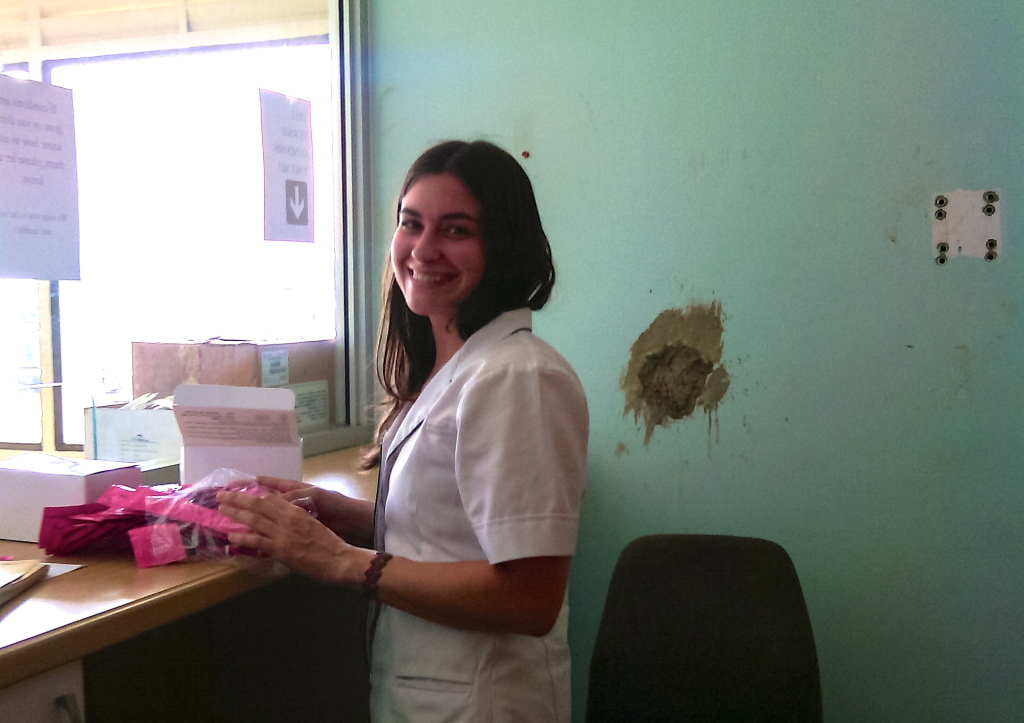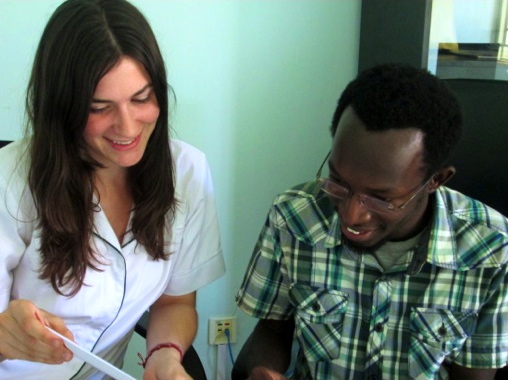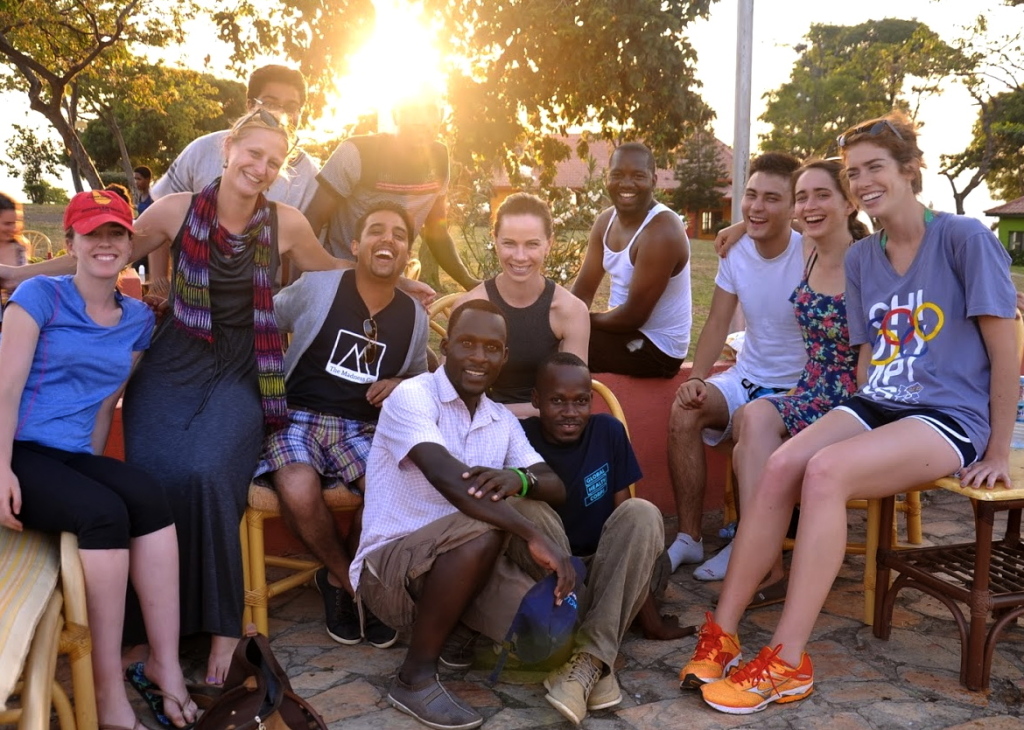Brooke Bachelor, a 2013 Northwestern University and 2009 University of Illinois graduate, is currently halfway through a Global Health Corps fellowship. While there are many different organizations available with which to work, she is working largely in quality improvement at the Joint Clinical Research Centre (JCRC), one of East Africa’s largest HIV research facilities, just outside of Kampala, Uganda. For 2015-2016, Global Health Corps will pair over 150 African and American fellows from various backgrounds to work together at high impact health organizations in the U.S. or one of five African countries (Uganda, Burundi, Rwanda, Zambia, or Malawi). The program was established in 2010 with the main aim of promoting global health equity through supporting of emerging global health leaders with various skills sets. The program is unique in that is intended for those 30 or under with an undergraduate degree and proficiency in English. No health experience necessary. Bachelor provides her insights on how the experience continues to influence her career trajectory and self-awareness. The deadline to apply to become part of the 2015-2016 Global Health Corps fellowship class is Tuesday, February 3, 2015.
By Brooke Bachelor
To give a little background, after studying nursing and Spanish in college and after five years of work as a nurse, I am now beginning my path to becoming a physician in August 2015. I decided to pursue the Global Health Corps fellowship because, in the midst of this career change, questions came to my mind. What aspect of health interests me the most? What skills do I need to be able to successfully open and run my own clinic domestically and internationally? Do I like interacting more with patients or would I prefer more behind-the-scenes work? Could I apply my skills in a new cultural context with which I have no previous contact or exposure? What can I do to be more resourceful in resource-limited settings?
The Global Health Corps fellowship allowed me to delve into these questions and into another avenue of health care that I had not previously experienced. The fellowship offers many safe and comfortable times in which to learn and reflect about my life.
My placement is at the Joint Clinical Research Centre in Lubowa, Uganda, just outside of Kampala. It is one of East Africa’s largest HIV research center and provides antiretrovirals (ARVs) to more than 14,000 patients annually. My personal role is multifaceted, but I work primarily in quality improvement, particularly in promotion and culture change surrounding hand hygiene improvement. I am also assisting with the creation of their high dependency hospital ward.
The structure of the fellowship makes it a win-win for both the fellows and the partner organizations. My work helps JCRC achieve its goals because I am able to take a wide look at the organization’s practices, almost like a consultant would, offering feedback based on my clinic experience to catalyze desired, system-wide change and implement best health care practices. Personally, I have strengthened my ability to be a self-starter, communicate and coordinate to get things done, and my research skills. I realize how much I thrive off of being face-to-face with patients, and I do not see myself doing administrative work in the near future.
The Global Health Corps fellowship is unique in many ways and I have been very satisfied with my experience thus far. One feature is that it pairs fellows from Africa and the U.S. together at the same organization. This co-fellow structure is really brilliant for many reasons. People from different backgrounds and with varying skills sets come together to work in solidarity, confronting some of the most challenging aspects of health care delivery that exist today. Each fellow has a built-in friend, one of whom knows the country in which you’re both placed. Each has someone with whom to talk, troubleshoot, and to whom one can ask questions, easing transitions and culture shock. The fellowship recognizes the benefit of pairing diverse skill sets, even if they have not previously been thought to relate to health, and young professionals both from health-related fields and from non-traditional careers such as architects and those who work in finance are encouraged to apply.
What I love about this fellowship, too, is that there is a really huge holistic support network. There is a lot of built-in reflection time, group activities that are very impactful, and a lot of goal-setting and follow-up to make sure fellows proceed through the year with purpose. There are structured reviews and even site visits by a coordinator for one’s region. One is never alone. Mental health is a big priority, and fellows always have access to counseling services through a wonderful organization, Still Harbor.
The support does not end on the emotional/spiritual level. Networking opportunities are plentiful, and I am thrilled to be paired with a mentor from Last Mile Health with a particular interest in quality improvement with whom I can communicate and brainstorm throughout my fellowship.
Regardless of geographical origin, all fellows are flown to a two-week orientation at Yale featuring world-class speakers and health experts and for the end-of-year retreat, all fellows are flown to a location in Africa. Therefore, fellows get to go both places throughout the course of the fellowship and experience a new culture. In addition to this thorough orientation and bonding opportunity with the new class, quarterly retreats serve as safe spaces to discuss challenges and collaborate with peers about real issues happening at our placement sites.
Another notable aspect of this program is the emphasis placed on alumni relations and the mentorship program. The alumni network is becoming very robust, and alumni retreats are becoming more common. I have over 100 other people in my class with whom I share a passion for health equity, and the sense of community is unparalleled.
I have come away with a few large lessons thus far. Personally, I have learned to enjoy a slower life and to focus on building a few really strong relationships. I need to take care of myself to best care for others and to do this, I find I feel best when I stay active and eat lots of greens and plant-based foods. Professionally, I really like working directly with patients and that a product should have a pilot before being expanded to a whole facility, such as getting feedback on condoms and tolerability of alcohol hand rub. I have learned the importance of getting direct feedback from people and even asking how people prefer to receive communication/feedback. Not everyone loves email.
In terms of life outside of work, I adore that I am the only foreigner in my community, Sseguku. It allows me to practice my Luganda with my neighbors and forge strong relationships with locals. I am deeply grateful for this opportunity, and I could not encourage you more to apply!
To find out more about Global Health Corps, follow @ghcorps on Twitter or visit their Facebook page.


